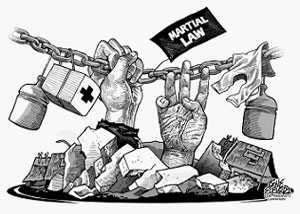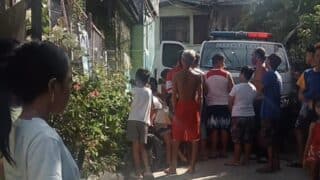
Bodies strewn across both sides of the roads, fallen trees, poles and just about everything else lying in the middle of the highway and blocking motorists from passing through and survivors “walking around in the daze” wondering what just happened and how to get supplies.
While the death toll is horrifying enough, the reality of the desperate plight of survivors in northern Cebu towns like Daanbantayan and Tacloban in Leyte province is driven home by reports of massive looting of retail stores and malls in Tacloban—Interior and Local Government Secretary Mar Roxas and a CNN anchor even witnessed these robberies in broad daylight, hours after Yolanda left the country.
Whether they be opportunistic criminals who want to corner the supply lines of relief assistance or people who are so hungry that they would resort to stealing, the fact is that the police and military are having a hard time curbing this menace, the last thing everyone in the affected areas need.
While one businessman, who was held at gunpoint by one of these marauding groups at Tacloban—called on the President to declare martial law—a suggestion that is both blunt and pointless considering that even at its worst, the typhoon-struck areas aren’t a threat to national security—it is clear that some semblance of order is needed to ensure the delivery of relief goods and cash aid.
President Benigno Aquino III may have been downright immature to walk out of a command conference addressing the situation in Tacloban—netizens described the President as being a brat and arrogant—but he is under enormous pressue, and like many other Filipinos, frustrated over the enormous needs arising across such a wide area after the supertyphoon.
This is not the time for leaders to bicker and engage in partisan politics when countless Filipino lives, including four million children, are depending on them for help in their direst hour of need.
Fortunately other countries and the United Nations have seen the plight of these devastated areas and offered to help in any way they can. It is up to the national government, the country’s armed forces and police to facilitate the delivery of assistance from the community of nations to the typhoon victims.
A state of emergency, not martial law, is essential in enforcing that semblance of order in these devastated areas.
Vice President Jejomar Binay was right—now is not the time to bicker and argue, it’s time to reach out and help these victims recover.


